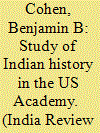| Srl | Item |
| 1 |
ID:
135797


|
|
|
|
|
| Summary/Abstract |
Conventional views of regions and regionalism begin with geography, history, language or other categories of organization. In this article, I offer a new(?) concept: the colonial region and its concomitant sentiment of colonial regionalism. The colonial region is one formed under colonial rule to suit administrative needs. It may directly encompass some form of pre-existing region, or it may cobble together a variety of smaller areas—some perhaps regions of their own, others not—into one greater region. A colonial region is thus an artificial one, not necessarily taking into account local realities. Many of the presidencies, provinces, and princely states might thus be considered as forms of colonial regions. Such regions often have long lives, and over time, inhabitants within a colonial region come to take on a sense of identity and pride in that region. This article examines colonial regionalism in the Madras Presidency along the axes of pride in physical and human assets.
|
|
|
|
|
|
|
|
|
|
|
|
|
|
|
|
| 2 |
ID:
135796


|
|
|
|
|
| Summary/Abstract |
This introduction outlines some major ways in which regions and regionalism have been defined. It provides a brief overview of the contents of this special edition of India Review.
From India’s colonial period to the present, administrators, scholars, and pundits alike have prophesized India’s breakup and demise. They had some reason for concern, given the widely recognized diversity of India’s geography in addition to its linguistic, economic, religious, and ethnic communities. Many of these communities have found voice, and even success, in regional movements that have led to the creation of new states and the redrawing of India’s map. The reality is that India’s democratic framework and its ability to accommodate most of these demands demonstrates a fundamental resiliency.
|
|
|
|
|
|
|
|
|
|
|
|
|
|
|
|
| 3 |
ID:
074174


|
|
|